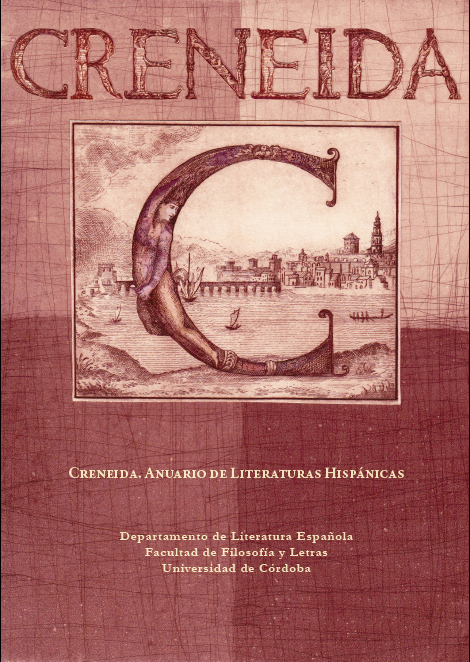From the Epic Poet to the Master of Prudence: Juan Rufo or the Fabric of Fame in Life and Death
Main Article Content
Abstract
Downloads
Article Details

This work is licensed under a Creative Commons Attribution-NonCommercial-NoDerivatives 4.0 International License.
Avisos de derechos de autor propuestos por Creative Commons
1. Política propuesta para revistas que ofrecen acceso abierto
Aquellos autores/as que tengan publicaciones con esta revista, aceptan los términos siguientes:- Los autores/as conservarán sus derechos de autor y garantizarán a la revista el derecho de primera publicación de su obra, el cuál estará simultáneamente sujeto a la Licencia de reconocimiento de Creative Commons que permite a terceros compartir la obra siempre que se indique su autor y su primera publicación esta revista.
- Los autores/as podrán adoptar otros acuerdos de licencia no exclusiva de distribución de la versión de la obra publicada (p. ej.: depositarla en un archivo telemático institucional o publicarla en un volumen monográfico) siempre que se indique la publicación inicial en esta revista.
- Se permite y recomienda a los autores/as difundir su obra a través de Internet (p. ej.: en archivos telemáticos institucionales o en su página web) antes y durante el proceso de envío, lo cual puede producir intercambios interesantes y aumentar las citas de la obra publicada. (Véase El efecto del acceso abierto).
References
Antonio, Nicolás, Bibliotheca Hispana Nova, Madrid, Joaquín de Ibarra, 1783.
Bélaygue, Z., “Deux sonnets inédits d’Ercilla”, Bulletin Hispanique, 2 (1990), pp. 80-84. DOI: https://doi.org/10.3406/hispa.1900.1216
Cascales, Francisco, Tablas poéticas, ed. Benito Brancaforte, Madrid, Espasa-Calpe, 1975.
Díez, José Ignacio, “Un prosímetro panegírico de Cristóbal Mosquera de Figueroa: el Elogio al retrato de don Álvaro de Bazán”, Criticón, 132 (2018), pp. 71-84. DOI: https://doi.org/10.4000/criticon.3803
Dinter, Martin T. (ed.), “Autarchic Limbs: sententiae in Lucan”, en Anatomizing Civil War. Studies in Lucan’s Epic Technique, Ann Arbor, University of Michigan Press, 2012. DOI: https://doi.org/10.2307/j.ctv3znzd3
Ercilla, Alonso de, La Araucana, ed. Isaías Lerner, Madrid, Cátedra, 2011.
Flores, Pedro, Romancero general, Madrid, Juan de la Cuesta, 1614.
Gambin, Felice, “Gracián desde fuera”, en Baltasar Gracián: estado de la cuestión y nuevas perspectivas, coords. Aurora Egido y María Carmen Marín Pina, Zaragoza, Institución Fernando el Católico, 2001, pp. 165-174.
Gioviano Pontano, Giovanni, De Sermone. De la Conversation, Paris, Champion, 2008.
Gracián, Baltasar, L’Homme de cour, précédé d’un essai de Marc Fumaroli, Paris, Gallimard, 2010.
Marín Cepeda, Patricia, “Entre pliegos anda el juego: Juan Rufo y las cortes literarias en el tiempo de la Austríada”, Calíope, XXII, 1 (2017), pp. 165-188. DOI: https://doi.org/10.5325/caliope.22.1.0165
Medina, Luis de, Flores del Parnaso,Volumen 10 de Las fuentes del Romancero general, ed facsímil de A. Rodríguez Moñino, Madrid, Real Academia Española, 1957.
Morán Turina, Miguel, La memoria de las piedras. Anticuarios, arqueólogos y coleccionistas de antigüedades en la España de los Austrias, Madrid, CEEH, 2010.
Murillo, Jesús Cañas, “Lope de Vega, Alba de Tormes y la formación de la comedia”, Anuario de Lope de Vega, VI, 1 (2000), pp. 75-92.
Núñez Rivera, Valentín, “Mosquera de Figueroa, vir doctus et facetus”, en Cristóbal Mosquera de Figueroa, Paradoja en loor de la nariz muy grande. Paradoja en loor de las bubas, ed. Valentín Núñez Rivera, Salamanca, Universidad de Salamanca, 2010, pp. 113-117.
Ponce Cárdenas, Jesús, Gutierre de Cetina: Rimas, Madrid, Cátedra, 2014.
Ramírez de Arellano, Rafael, Juan Rufo jurado de Córdoba. Estudio biográfico y crítico, Madrid, Hijos de Reus, 1912.
Rosell, Cayetano, BAE, Poemas épicos, II, Madrid, Atlas (Biblioteca de Autores Españoles 29), 1854.
Rufo, Juan, Las seiscientas apotegmas y otras obras en verso, Madrid, Sociedad de Bibliófilos Españoles, 1923.
Rufo, Juan, Apotegmas y otras obras en verso, ed. Alberto Blecua, Madrid, Espasa-Calpe, 1972.
Rufo, Juan, La Austríada, ed. Ester Cicchetti, Pavía, Ibis, 2011.
Ruiz Pérez, Pedro, “Paradigmas genéricos en un romance de Rufo. ‘Los comendadores’ y la épica culta”, Rilce, 7 (1991), pp. 109-131. DOI: https://doi.org/10.15581/008.7.27133
Santa Cruz, Melchor de, Floresta española, Barcelona, Crítica, 1997.
